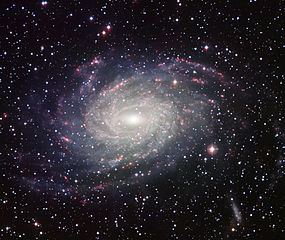Fred Heeren: Home Alone in the Universe?
Fred Heeren, “Home Alone in the Universe?” First Things (Mar 2002, No 121), pages 38-46.

Galaxy NGC 6744.
Source: ESO. eso.org
I always enjoy reading contemporary articles that offer fresh evidence for faith in the God of the Bible, even if such “evidence” is somewhat indirect. I found this recently in a well-written summary and critique of another “faith,” the predominantly non-Christian belief in extra-terrestrial life. Science journalist Fred Heeren summarizes the search for intelligent life in the universe and focuses on why no such life has yet been found.
Despite what popular culture in America has been led to believe about “the awful waste of space” if aliens are not out there, most extra-terrestrial intelligence believers are unaware of recent evidence for and against ETI. “If the public knows little about the best reasons to believe in intelligent extraterrestrials, it knows even less about the reasons to doubt” (p. 42).
Perhaps you have never heard of Fermi’s Paradox, but it is still one of the strongest arguments against the existence of intelligent life anywhere but Earth.
It all happened over a Los Alamos lab lunch in the summer of 1950, when renowned Italian physicist Enrico Fermi had one of those napkin-scribbling epiphanies. His conclusion stemmed from the indisputable premise that there are billions of stars in our galaxy that are older than our sun, and that life routinely develops under favorable conditions.
Exhausted planet resources and dying stars would provide good motives for exploration and homesteading. Some cultures, like our own, would find other motives for colonizing, and it would only take one enterprising population to begin exponential expansion. Fermi showed that, even assuming modest speeds, every habitable star system in the galaxy should have been colonized within mere millions, not billions, of years. Complete colonization could take place in the relative twinkling of a cosmic eye, many times over, in a ten-billion-year-old galaxy like the Milky Way. “So,” asked Fermi, “where are they?”
It is not a stretch to say that since no satisfactory answer has yet been given, perhaps some of those “indisputable” premises are, in fact, rather disputable. However, evidences against believing in extra terrestrial intelligence do not stop here. Heeren goes on to list some other significant reasons to show how unique and unlikely Earth is: its large moon, its “main sequence” Sun, special gas giant neighbors like Jupiter, location in the galaxy, and just the right amount of radioactive elements in the just-right crust. Then there are all of the “coincidences” biological evolution (if one believes in it) required for the development of human intelligence. Improbable events that Darwinian evolution could not predict had to have occurred according to today’s evolutionary biologists. Two of these they claim must have taken place to make way for man were something to wipe out dinosaur life (I believe the flood of Noah is the best explanation) and the “Cambrian explosion” without the evolutionary development of any major animal groups (called phyla) since then (supposedly 530 million years ago).
British astronomer John Barrow is quoted as saying that “there has developed a general consensus among evolutionists that the evolution of intelligent life, comparable in information-processing ability to that of Homo sapiens, is so improbable that it is unlikely to have occurred on any other planet in the entire visible universe” (p. 44). This leads Heeren to affirm that the laws of nature seem stacked against intelligent life developing, “Neither biologists nor astronomers see anything imperative about the many contingencies that had to be met, against all odds, for us to be here” (p. 45). Therefore, the idea that the universe is teeming with intelligent life, or even life, is not a presupposition supported by science.
Category: Fall 2002, Living the Faith, Pneuma Review


